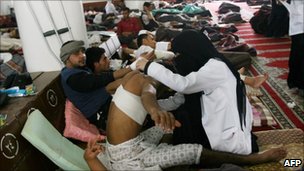Yemen 1st-Hand: The Field Hospital Inside the Mosque
See also Tunisia, Libya, Syria (and Beyond) LiveBlog: Election, Liberation, Protest
 Laura Kasinof writes for The New York Times:
Laura Kasinof writes for The New York Times:
The calm inside the mosque quickly turned to mayhem as the first victim of a deadly attack on a protest march was brought in on a stretcher. The young man grasped at his abdomen with bloodied hands.
Soon there were dozens of gunshot victims, clutching wounds as they were rushed into the room designed for prayer and reflection, but now functioning as a field hospital for protesters gunned down by their government.
“What are the reasons to kill people? You can’t justify this,” said Ghada Qassim, a doctor, overwhelmed by the scene before her. “They have no weapons. It is a disaster.”
Nine months ago, when protesters took to the streets in large numbers, demanding the ouster of their autocratic president, Ali Abdullah Saleh, volunteers transformed this mosque into a field clinic, a theater for performing emergency surgery or simply treating those overcome by tear gas.
Mr. Saleh’s forces and the bands of plainclothes thugs who support them have repeatedly, over those many months of protest, opened fire with live rounds. Sometimes the wounds are from a sniper’s bullet, other times indiscriminate fire from a Kalashnikov, or perhaps shrapnel from a mortar round. Sometimes it is protesters, seeking to make a point, walking right into open fire.
But always, the mosque fills with the wounded, and always, the volunteers — there are around 300 of them — get down to work.
“We are here so we can do something humanitarian,” said Suheib al-Dambani, a 28-year-old paramedic sitting in the back of an ambulance borrowed from the nearby Science and Technology Hospital.
This was another typical day for a country spiraling from blood-soaked crisis to blood-soaked crisis. The protesters will not leave the streets. The president refuses to leave power, the bullets keep flying and the mosque keeps filling with patients. The number of wounded escalated when urban warfare actually broke out in September between government forces and a division of the military that had defected.
When the first gunshots on Tuesday cracked in the streets, Mr. Dambani jumped into the minivan that acts as an ambulance and sped off.
“We feel very sorry in our hearts about the patients here,” said Dr. Mohammed Qubati, the head of the makeshift hospital who during busy weeks has been able to go home for only a few hours. Other days he sleeps alongside other volunteers on the blanket-strewn second floor of the mosque.
“I have seen people with half a body, half a head,” he said. “What can we do? We cry.”

 Monday, October 24, 2011 at 9:54
Monday, October 24, 2011 at 9:54
Reader Comments